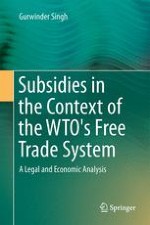Abstract
The primary function of the WTO as a multilateral organisation is to regulate trade among the Member States, and this also implies discussion on issues with different set of values, such as the affect of free trade on the environment. The discussion concerning the ‘impact of trade subsidies on the environment’ revolves around two planes, (1) the principal objective of the WTO i.e., the promotion of free trade among its Member Nations together with the complex values, compounded, (2) such as sustainable development, the pursuit of which obviously goes alongside. It is ironical that within the WTO trading system, there are several agreements promoting free trade, but no explicit wide-ranging agreement, supporting environment-related issues on a parallel basis. While the WTO tries to promote free trade along with sustainable development, however, what adds to the biased position are the competing interests of the Member States in practice. The contradiction in practice is further deepened whenever the occasion arises for the multinationals to make a choice between trade and environment standards. From the analysis, it can be observed that the legislative bodies and the judicial bodies of many of the Member States follow an unbalanced approach, thus leading to a dilemma over the preference between trade and environment. This further draws attention to a question of whether the lack of a clear basis to make choices between the two objectives, also obstructs the evolution of a general normative set up of environmental values on a global basis. The issue of free trade and the environment sustainability, taken together also touches the institutional character of the WTO, which within the parameters of this discussion is tested through, several theories on environmental law.
A key concern when studying, the effect of subsidies on the environment is to analyse how far the WTO is capable of fulfilling a proper institutional role, by promoting sustainable development along with free trade. In the light of these propositions, this study seeks to make a comparative analysis, between the business attempt for benefit as a consequence of free trade, but at the cost of environment. The comparison is made by quoting several instances of the trade practices among the Member States. In this context, the benefits obtained are compared with trade subsidies for the purpose of broadly applying fair trade concepts as regulatory measures. Further, this study also attempts to examine the institutional and normative basis of the organisation, for a better understanding and in order to make informal recommendations about the WTO reform. The chapter begins by tracing the basic WTO objectives & Members State’s relationships with issues related to trade protectionism and maintaining environment standards. Due to the lack of supportive agreements in the WTO and in order to protect environment, some authors have taken a critical perspective about the functioning of the WTO, however, it seems that the institutional balance between the objectives of free trade and sustainable development is the better option.
